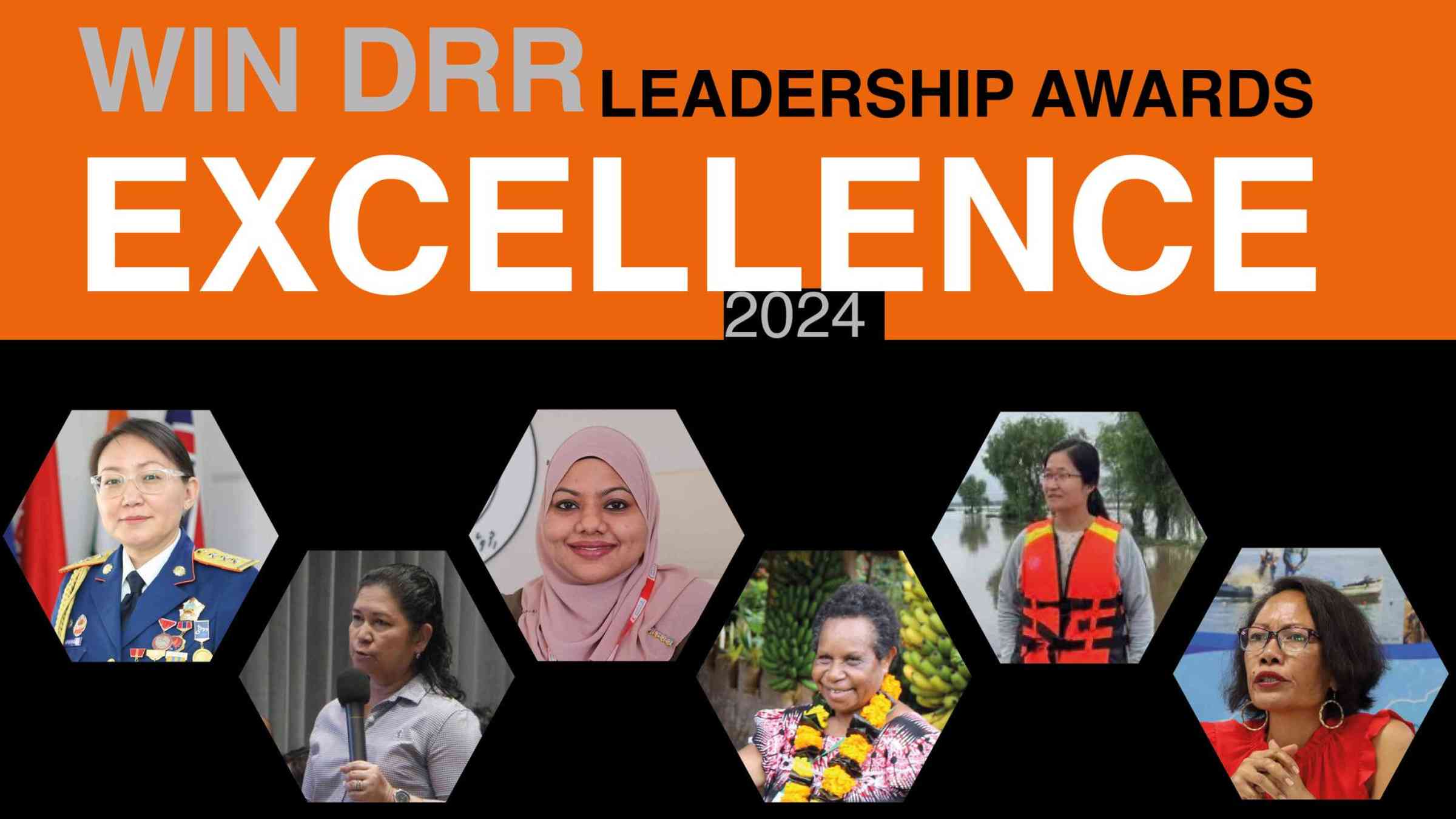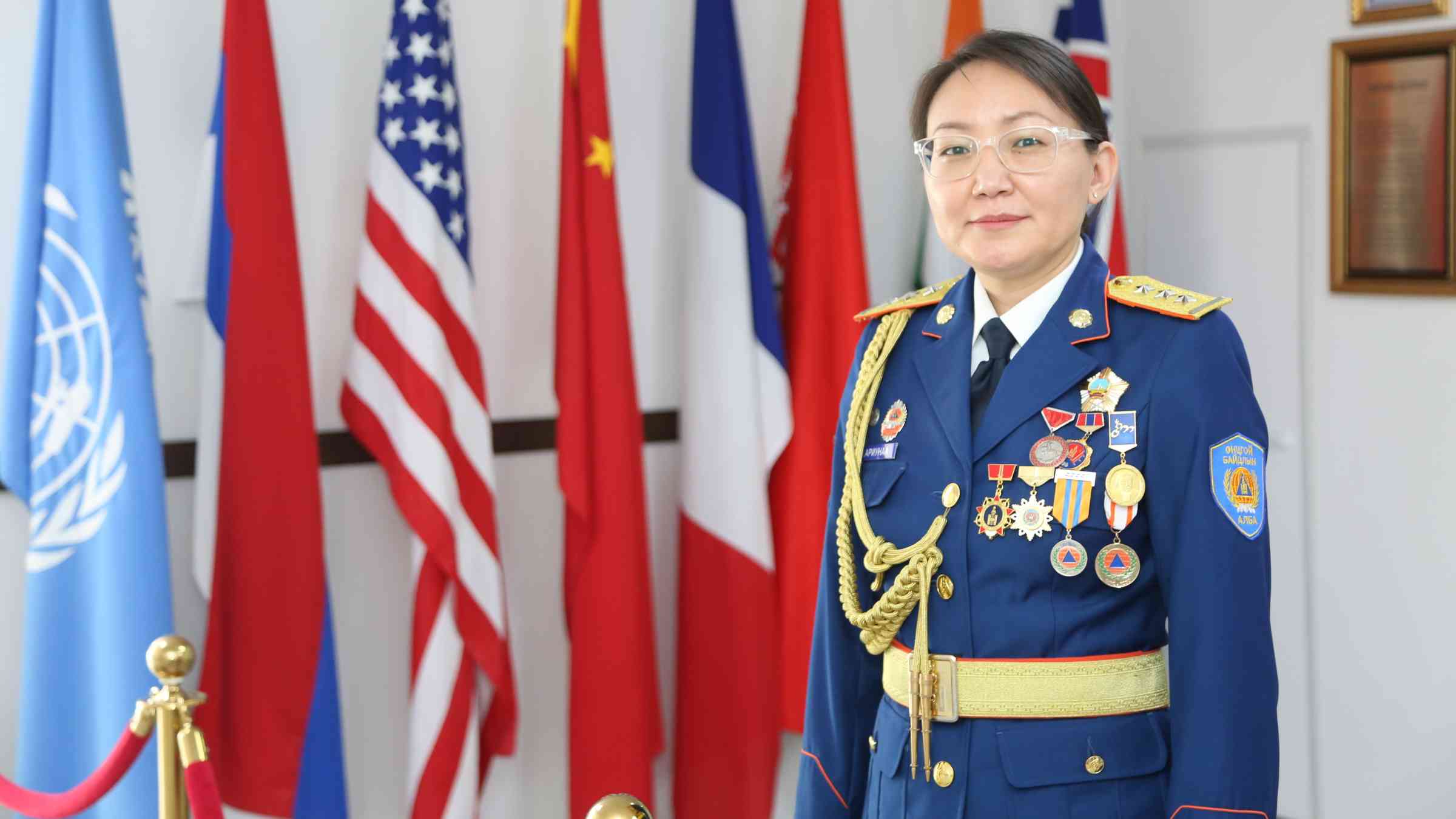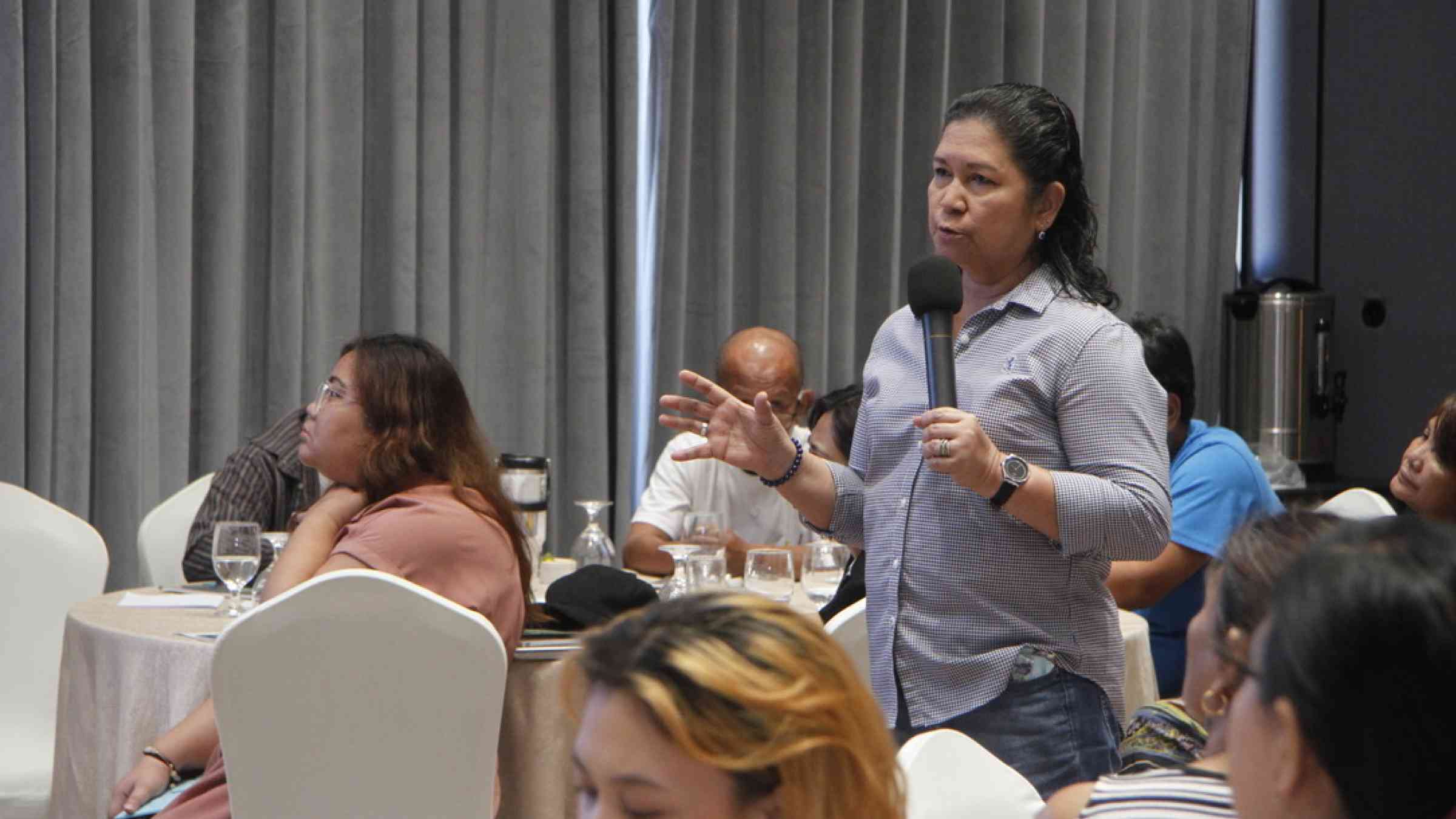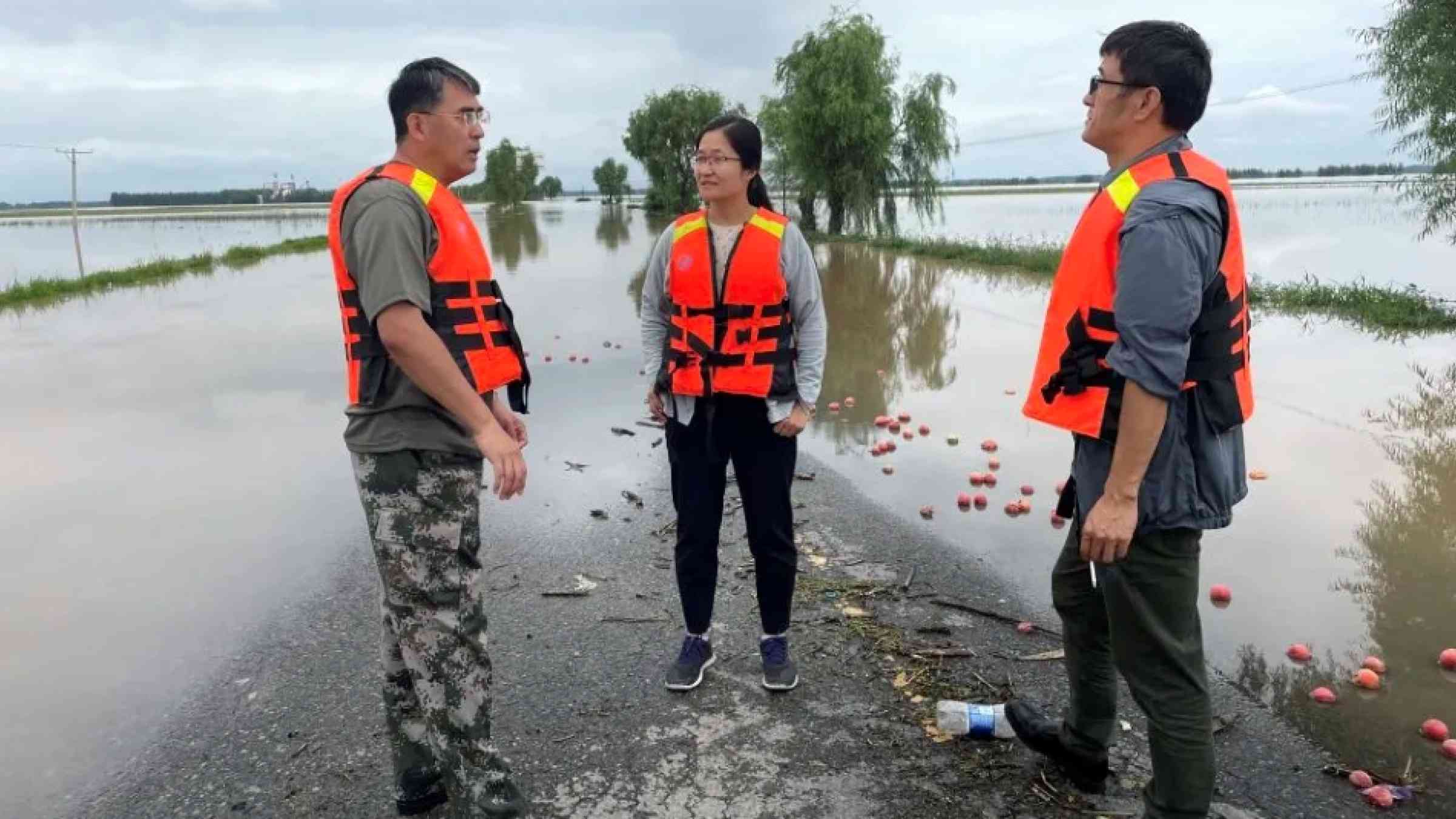WIN DRR Leadership Awards 2024: These are this year’s Excellence Award finalists

For the fourth consecutive year, six women from across Asia and the Pacific have been chosen as finalists for the 2024 Women’s International Network for Disaster Risk Reduction (WIN DRR) Excellence Award. They have achieved exceptional professional success in disaster risk reduction and represent the expertise and experiences that are needed to find solutions to understanding, preventing, and reducing the increasing disaster risk in the most disaster-prone region of the world.
Ariunaa Chadraabal – Mongolia

At the end of July 2024, Colonel Ariunaa Chadraabal from Mongolia’s capital city Ulaanbaatar ended her 23 years of service with Mongolia’s National Emergency Management Agency (NEMA). A pioneering figure, she was the Head of the Foreign Cooperation Division at Mongolia's NEMA, and one of the few female colonels in Mongolia. She has forged international cooperation and partnerships that have significantly improved Mongolia's disaster risk management and reduction capacities and taken them abroad to support other countries in the region. Under her leadership, NEMA has expanded collaborations with over 30 countries in Asia, the Pacific and Europe and 50 international organizations, facilitating knowledge exchange and adoption of best practices. She is now working as the head of the United National Resident Coordinator’s Office in Mongolia.
In 2018, Colonel Ariunaa brought the Asia Ministerial Conference on DRR – the regional platform to monitor, review and enhance cooperation for the implementation of the Sendai Framework for Disaster Risk Reduction 2015-2030 – to Mongolia and ensured the smooth execution of this large conference. She is also a strong advocate for cross-border cooperation, working closely with neighbouring countries like China to prevent forest and steppe fires, and has pushed for the establishment of a regional DRR platform in northeast Asian.
Colonel Ariunaa has been instrumental in Mongolia’s transition from a civil protection to a more comprehensive DRR approach, which is reflected in various policy developments she has initiated and led. She has played a key role in formulating the National Disaster Management Plan, revising the Law of Mongolia on Disaster Risk Reduction, and the National Programme of Community Participatory Disaster Risk Reduction. These frameworks provide a robust foundation for disaster risk management both at national and local levels. Her grassroots efforts have significantly impacted Mongolia's local communities. She has worked closely with 21 cities and the capital city, Ulaanbaatar, to engage them in the Making Cities Resilient 2030 initiative, demonstrating her belief that meaningful progress in DRR requires building resilience at the community level, particularly by involving those most at-risk to disasters.
Additionally, Colonel Ariunaa has combined her practical expertise with academic excellence. Her doctoral research at Nagoya University in Japan focuses on dzud risk management and early action strategies. This research has directly informed her efforts during the devastating dzuds of 2023 and 2024, where her leadership in crafting and implementing a comprehensive risk management plan helped mitigate the disaster's impact across Mongolia.
"As a woman in disaster risk reduction, I am motivated by the strength and resilience of the communities I serve. I believe that empowering women and incorporating their voices in decision-making is key to building more inclusive, resilient societies."
Loreine Dela Cruz – Philippines

As the Executive Director of the Center for Disaster Preparedness Foundation (CDPF), Loreine Dela Cruz from Manila in the Philippines has been a driving force in DRR and climate change adaptation in the Philippines. Since 2012, her leadership has transformed CDPF from a modest organization into a prominent advocate for inclusive, gender-responsive, and community-led DRR efforts, significantly growing its scope and impact.
Loreine has spearheaded various initiatives and projects that have strengthened local resilience and fostered rights-based DRR and humanitarian actions. Her work is deeply rooted in the belief that effective DRR must be inclusive and grounded in the needs, culture, and contexts of those most at risk of disasters. This vision has manifested in projects such as the Pinnovation Academy, which supports community-led innovations in different parts of the country, and the Abot Kamay Community Solidarity Fund, which empowers communities to take and lead DRR actions in various themes and locations. Loreine also strongly advocates for comprehensive approaches, including DRR, adaptation, community philanthropy, and other climate change actions.
Loreine's commitment to inclusivity also extends to her leadership roles beyond CDPF. Her role as co-chair of the Philippine Preparedness Partnership (PHILPREP) exemplifies her dedication to localizing DRR and climate change adaptation and fostering collaboration between government entities, civil society, the private sector, and academia. Loreine’s impact is also evident in her work to strengthen the capacity of local government officials and communities. She has facilitated trainings and planning processes to build knowledge and ensure that local governments and communities work together to reduce disaster risk. She is one of the active leaders of the Asia Localisation Lab covering eight Asian countries and the lead convener for the Philippine Localisation Lab.
Loreine calls for considering gender-based economic and political inequalities, as they are the root causes of vulnerability, to ensure that these structural inequalities faced by women and vulnerable populations become a priority. She thinks that women-led initiatives and actions need to be continuously supported as they impact women and the entire vulnerable section of the population. Women's leadership is a shining example for other vulnerable sections of the population. Reflecting on her work, Loreine says:
“Empowering women and girls and amplifying their voice as equal players in decision-making and implementation in disaster risk reduction and resilience building are crucial and critical. Women can be trailblazers and provide the model of advocates and leaders for resilience, power shift and sustainability.”
Fathimah Himya – Maldives

As the Secretary General of the Maldivian Red Crescent, Fathimah Himya from Male in Maldives has been a pivotal figure in DRR in the Maldives, a country profoundly affected by climate change and natural hazards. After the 2004 Indian Ocean tsunami, she joined the nascent organization and helped set up the branch structure to manage volunteers and programme implementation. With a career spanning over two decades, Himya played a pivotal role in transforming the Maldivian Red Crescent into the largest humanitarian entity in the country, dedicated to supporting communities across 187 low-lying atoll islands, and played a crucial role in shaping the organization's approach to disaster management.
Himya has adeptly combined humanitarian and development efforts with climate action, ensuring that the Maldivian Red Crescent not only responds to emergencies but also actively engages in environmental conservation and restoration of ecosystems to build resilience against disasters. Today, Himya oversees hazard vulnerability mapping and the development of island disaster management plans in collaboration with the National Disaster Management Authority, underscoring her commitment to integrating climate adaptation with community-based risk management. Her work also focuses on inclusion and capacity building of women in communities, noting the key role women play in disaster management.
Himya's work has revolutionized a local decentralized approach to accessing all communities across the Maldives with DRR. The partnerships she has fostered with the Maldives Meteorological Services and National Disaster Management Authority has enabled volunteers from within the community to inform and prepare island communities to take action after receiving early warning messages, particularly related to tsunami risk.
Himya’s leadership is characterized by her ability to navigate complex challenges with compassion and effectiveness. She was recently reappointed for a second term as Secretary General, reflecting her visionary leadership, particularly during crises like the COVID-19 pandemic. As the only female leader among her South Asian peers in the Red Cross and Red Crescent Societies, Himya has earned respect and is often asked to represent the collective in international forums. Himya became a mother during her period in senior leadership and has been a role model for others in leadership positions, showing that it is possible to excel in both professional and personal spheres.
Her commitment to DRR and humanitarian work is driven by a deep sense of integrity and dedication. As she puts it:
“Empowering communities and fostering resilience is not just a professional commitment but a personal mission. Every step we take to strengthen local capacities is a step towards a more resilient future.”
Maria Linibi – Papua New Guinea

Maria Linibi from the Markham Valley in Papua New Guinea leads the Papua New Guinea Women in Agriculture Development Foundation (WiADF), which supports more than 20,000 women farmers across Papua New Guinea. Under her leadership, WiADF has become a cornerstone in promoting disaster resilience. Her work focuses on fostering climate-resilient farming systems by collaborating with traditional leaders and research institutions to promote indigenous crops and low-cost irrigation and agroforestry systems that mitigate the impacts of droughts.
Maria has effectively mobilized significant resources to build the resilience of local communities in Papua New Guinea by advocating for the needs and solutions of women farmers to policymakers and development partners. Notable achievements include securing funding for the installation of solar rice mills for women farmers. Other partnerships have resulted in the installation of solar water pumps, providing not only irrigation but also potable water, thus improving the daily lives of hundreds of women farmers who previously carried 20-liter containers up to 20 kms.
As the President of the WiADF and Board member of the Pacific Island Farmers Organization Network, Maria sits at the center of a vast network of people, information and opportunities. As such, she brokers relationship and connects people with opportunities and resources, demonstrating exceptional leadership skills.
Her strategic vision and dedication have earned her a pivotal role in different influential platforms. Maria’s efforts were evident when she represented Pacific women farmers at the Policy Dialogue on Women in Agriculture and Fisheries at the Asia-Pacific Economic Cooperation meeting and the Food and Agriculture’s Asia Pacific Regional Conference. Her participation in these high-level forums has ensured that the voices of Papua New Guinea and Pacific women farmers are heard and addressed at the highest levels of decision-making.
Maria’s deep compassion is evident in the pride she takes in farmers’ successes. From a farmer receiving their first payment for a new crop to a group venturing into agri-processing or an entrepreneur launching their first agri-business, Maria is always informed and celebrates these milestones with genuine joy.
“Empowering women farmers and amplifying their voices in policy discussions is not just about improving agricultural practices; it's about creating a more equitable and resilient future for all.”
Chu Minghua – People’s Republic of China

Chu Minghua from the People's Republic of China is the Deputy Director at the Ministry of Water Resources' Disaster Reduction Center and Deputy Director General at the Remote Sensing Technology Application Center and Research Center on Flood & Drought Disaster Prevention and Reduction of the China Institute of Water Resources and Hydropower Research. With 16 years of dedicated service, Minghua has left an indelible mark on flood management in China, particularly through her work in innovative technology integration.
A recent standout achievement in Minghua’s career is her role in addressing the 2023 catastrophic flood in the Haihe Basin. Using a self-developed digital twin system and remote sensing technology, she led a team that accurately predicted flood front movements and managed floodwaters across 84 reservoirs. This proactive approach not only minimized flood damage but also safeguarded millions of people and protected vital farmland.
Minghua’s recent efforts also include spearheading the national flash flood disaster monitoring and early warning system. Her work has been pivotal in establishing a comprehensive early warning network across 2,076 counties, greatly benefiting residents in mountainous and hilly areas prone to flash floods. This system ensures timely alerts and enhances community resilience.
In addition to her technical expertise, Minghua has been a fervent advocate for education and training. She has conducted targeted training for water management personnel, including officials from the Changjiang River Commission and Shandong Province, focusing on flood control, disaster reduction, and emergency response. Her educational initiatives, such as authoring the book series "Don't Be Afraid of Flash Floods," have equipped young people with vital knowledge on disaster preparedness.
Minghua’s leadership also shines through her innovative approach to integrating technology with traditional flood management practices. Her work on the Yellow River and Lake Taihu Digital Twin projects exemplifies this, merging satellite data and drone surveillance to enhance real-time decision-making. This blend of cutting-edge technology with practical application not only advances flood management but also sets a new standard for future disaster management strategies.
Minghua’s efforts extend beyond the professional realm, as she also champions gender diversity and personal wellness. Her role as a mentor and advocate for women in leadership, combined with her active involvement in women’s football and marathons, reflects her holistic approach to fostering resilience both in her field and in her community. As she puts it:
“Innovation and preparation are the cornerstones of effective disaster management. By leveraging new technologies and fostering education, we build stronger, more resilient communities.”
Muliagatele Filomena Nelson – Samoa

Muliagatele Filomena Nelson’s journey has been transformative not only for Samoa but for the entire Pacific region. As the Climate Change Adaptation Adviser at the Secretariat of the Pacific Regional Environment Programme (SPREP) – the regional organization of the Pacific to protect and manage the environment and natural resources – Filomena has been at the forefront of integrating approaches to reduce disaster and climate risks and enhancing community resilience.
Currently, at SPREP, Filomena drives forward initiatives aimed at enhancing disaster resilience in the Pacific. Her work involves integrating environmental and social safeguards into infrastructure projects, ensuring that new roads and developments are designed with climate risks in mind.
Filomena is also the lead advisor at SPREP on climate-induced loss and damage where she has led the first ever Pacific regional dialogue on loss and damage and the development of the first ever project to support Pacific countries in strengthening policy and institutional frameworks and designing fit-for-purpose responses for addressing loss and damage.
Filomena began her career two decades ago with Samoa's Ministry of Natural Resources and Environment, where she was instrumental in shaping the country's disaster management framework. She led the establishment of a comprehensive disaster management office and was pivotal in broadening the scope of disaster management. Her work extended beyond responding to cyclones to include a wider range of hazards and focused on reducing disaster risk by linking scientific data with communities. She was instrumental in the establishment of Samoa’s end-to-end tsunami early warning system two years before Samoa was hit by the 2009 tsunami that killed 149 people, displaced more than 5,000 people and caused damage valued at about US$124 million.
Filomena's leadership goes beyond technical solutions; she has been a fervent advocate for increasing female participation in DRR. Under her guidance and as a role model, there has been a significant increase in the roles of women within Samoa’s disaster management offices and related agencies.
“It was not easy to be involved in DRR back in the day because it was dominated by men. As a woman, when you were trying to explain yourself or bring in a new idea, you expected to get pushed back. It is great to see how this has changed today,” she says. “There are a lot of women in leadership positions in government agencies and civil society. Today, we need to provide the space for women to work in disaster risk management and climate change, and encourage and train them so they have the knowledge and tools to become even more impactful.”
In her current role with SPREP, Filomena continues to be a dedicated mentor for Pacific women negotiators, striving to equip them with the skills needed to influence global climate negotiations.
“It is important that women know there is space for them at the climate table, and we must continue to build up emerging women negotiators to ensure their voices are heard,” she says.
Filomena Nelson’s commitment to DRR and climate change adaptation and loss and damage showcases her extraordinary leadership and dedication to building resilient communities. Her ongoing efforts not only address immediate climate challenges but also pave the way for future generations of women leaders in the Pacific.
Background
The WIN DRR Leadership Awards recognize women's achievements in DRR across the Asia-Pacific region. The awards are part of UNDRR's flagship women's leadership initiative, the Women's International Network for Disaster Risk Reduction (WIN DRR), supported by the Government of Australia. There are two award categories, the Excellence Award and the Rising Star Award. The Excellence Award of US$10,000, proudly sponsored by SM Prime, will be granted to an individual woman who has achieved exceptional professional success in DRR. The winners will be announced during the Asia-Pacific Ministerial Conference on Disaster Risk Reduction (APMCDRR) on 16 October 2024 in Manila, Philippines.
In addition to the WIN DRR Excellent Award finalists presented above, also see the Rising Star Award finalists 2024 in this blog.
Join the Women’s International Network for Disaster Risk Reduction
The Women's International Network for Disaster Risk Reduction (WIN DRR) is a professional network to support women working in disaster risk reduction, in all their diversity. WIN DRR promotes and supports women's leadership in disaster risk reduction across the Asia-Pacific region and aims to reduce the barriers faced by women and empower them to attain leadership and enhance their decision-making in disaster risk reduction. WIN DRR is supported by UNDRR and the Government of Australia.